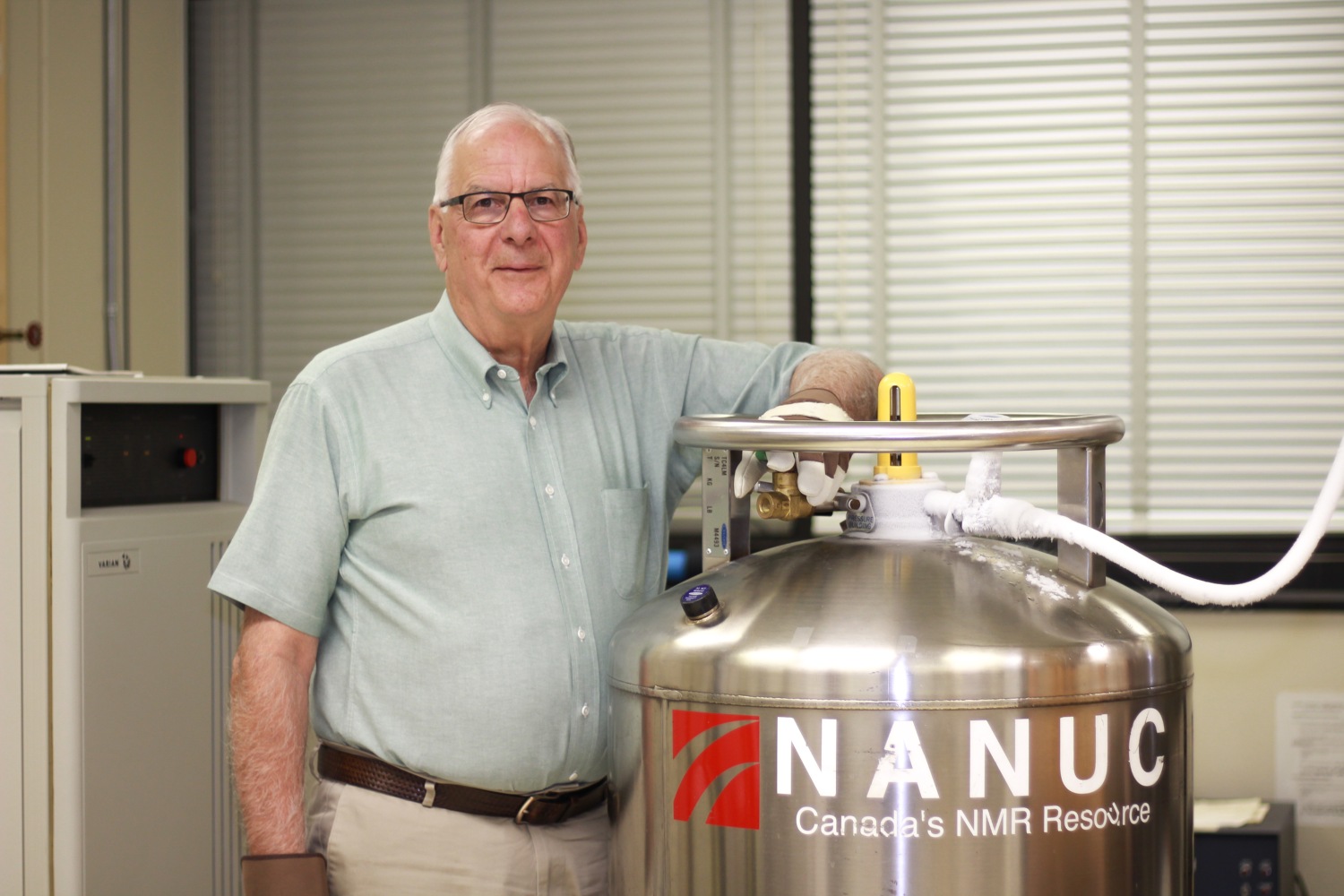
Brian Sykes will be honoured at the Department of Biochemistry's Career Celebration on June 13-15, 2018.
In a lifetime dedicated to scientific learning, Brian Sykes has attended more professional gatherings and symposiums than he could ever hope to remember. His next might be the first that is truly unforgettable-a three-day symposium to be held in his honour, and filled with familiar faces.
"All of the speakers [at the symposium] [were at one point my students and] will represent just a fraction of the people who have worked in my lab at the University of Alberta over the years," said Sykes, an emeritus professor of biochemistry at the U of A. "They've been a family in some sense. I'm proud of all of them and hope I had some influence on them. But I've just been fortunate to have had good people."
The symposium at the U of A is to celebrate the career of Sykes, who is preparing to step back from his duties after more than 49 years in academia-43 of those at the U of A. Over the next three years, Sykes will wind down a career that has been among the most accomplished ever seen at this university.
Raised in Alberta, Sykes graduated with an honours degree in chemistry from the U of A in 1965 before heading to the halls of Stanford University, where he earned his PhD. He then became an assistant and associate professor of chemistry at Harvard University from 1969 to 1975, before returning to the U of A.
He started out as an associate professor of biochemistry, and over the years added to an ever-growing list of accomplishments, including serving as department chair, Canada Research Chair in Structural Biology, and as a visiting professor at King's College in London.
His accolades include a Distinguished University Professorship, the Gordin J. Kaplan Award for Research Excellence, and a Fellowship in the Royal Society (London). In 2010 he was also awarded the University Cup-the U of A's highest faculty honour.
"We use the term 'world-class' quite loosely these days but we are talking real world-class here," said Charles Holmes, a colleague of Sykes and chair of the U of A's Department of Biochemistry. "He is the father of the field of nuclear magnetic resonance spectroscopy. There are very few individuals that get to say that about their research careers, no matter what field they are in."
Sykes' efforts over his career have focused on exploring the mysteries of protein structure and how those structures impact the function of many biological systems including human muscle. By determining what happens to proteins during a heart attack, for instance, Sykes and his fellow researchers have worked to help influence smarter drug design. His life's work has set a high standard for others to follow, having published more than 600 research articles over the course of his career with more than 32,000 citations among them.
Along the way, Sykes has inspired and lifted the learners that have trained with him, building a rapport and feeling of collaboration that has powered his teaching and research throughout his time at the U of A. He estimates as many as 100 trainees have gone through his lab over his nearly five decades in academia. Many have now gone on to become pre-eminent scientists in their own right, among them Lewis Kay, '83 BSc-Gairdner award winner, recipient of the Herzberg Gold Medal and one of Canada's top scientists-and Sam Sia, '97 BSc, who was named by MIT Technology Review as one of the world's top young research innovators.
"Working summers in Brian's lab was a pivotal point in my career," said Kay, now a professor of chemistry, biochemistry and molecular genetics at the University of Toronto. "I was able to learn from a master and it gave me a huge advantage over my peers. And the interest that Brian has shown in my achievements and the friendship stemming from that period have been fantastic."
"My appreciation of Brian has only gone up with time now that I see what the academic job entails," added Sia, an associate professor of biomedical engineering at Columbia University. "He is a true hero in my eyes with his amazing research accomplishments and genuine care and affection for his students."
"That to me says everything about Brian," explained Holmes. "You've had a string of outstanding individuals who have trained with Brian and gone on to do great things. Many of them attribute the start in their careers to the mentorship that Brian has given them. So I think you could say that Brian is a world-class scientist for sure, but he is also a world-class mentor."

Above: Sykes' PhD graduates are remembered with a bottle of champagne in their name, displayed on a shelf in his lab.
According to Sykes, the opportunity to work with learners has been a source of continual enjoyment. He learned early in his career that each had different talents and skills, and that much of his work had to do with guiding them to their areas of strength. By encouraging both independent thought and collaborative teamwork, together they would often veer off into new and exciting avenues of research.
Today, as Sykes reflects back on a long career, he's grateful for the colleagues who supported him and the lifelong friendships he's made along the way. While his work may be winding down, Sykes isn't stepping away yet as he still has more publications to come and learners to oversee. It's clear the burning desire to explore the mysteries that have driven his life's work hasn't ebbed yet.
"I still lie up at night thinking about some stupid problem in the lab," said Sykes with a laugh. "My wife, she says when I retired I moved the wake-up call from 7 a.m. to 7:30 a.m. That was my concession to retirement. She thinks that's funny."